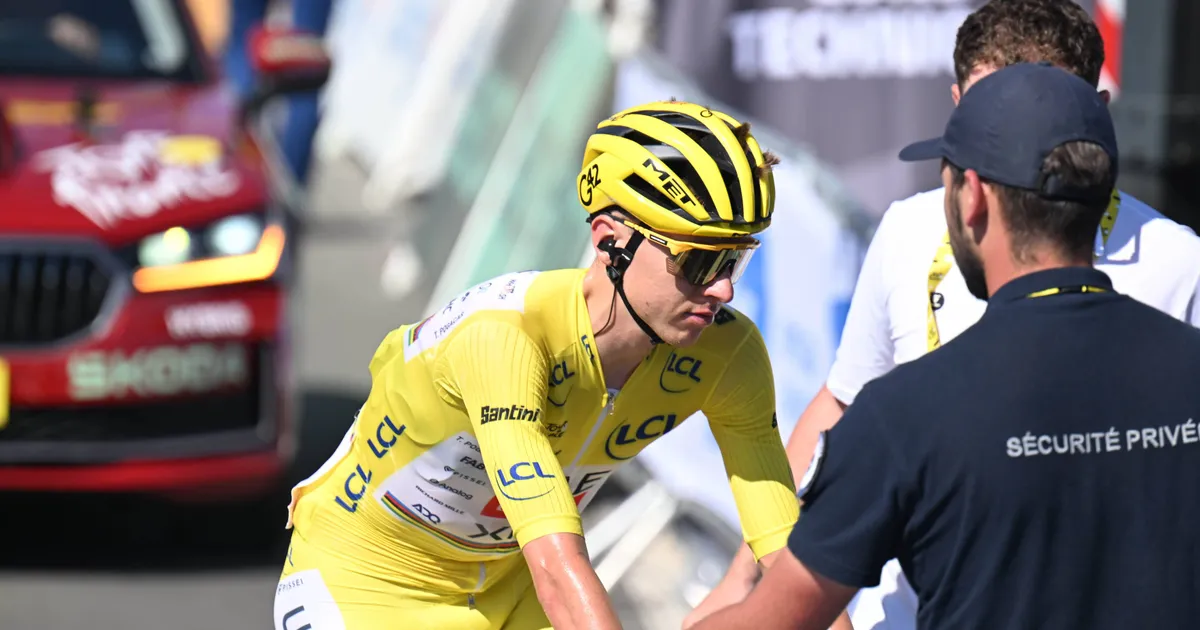“The day after Ventoux I had knee problems, and I started doubting whether I’d even be able to continue,” Pogacar said earlier this month on the Tour 202 podcast. “My body was in shock. I didn’t feel great.”A crash, a knee, and a tactical shift
Horner pointed to the turning point: Pogacar’s late crash on stage 11. “He overlapped wheels with a Uno-X rider, slid out to the left side, hit the island, jumped back up and got on his bike,” Horner recalled. “I’m not saying that caused the problem — we don’t even know which knee it was — but when you hit the hip hard like that, your alignment can shift. Then you’ve got thousands upon thousands of pedal strokes, and something’s going to give.”
The pain, according to Pogacar, appeared after stage 16 to Mont Ventoux. From that point on, the UAE Team Emirates – XRG leader appeared more subdued, both on the bike and in interviews. His attacking instincts — so often the hallmark of his racing style — were replaced by cold calculation.“This is the more educated, adult experience now that Pogacar is coming into,” Horner said. “If you can’t get rid of Jonas Vingegaard straight away, you don’t want to lose time to him either. So he raced wisely. He backed off the throttle.”
That approach was visible on stages 18 and 19, where Ben O’Connor and Thymen Arensman took memorable victories while Pogacar sat tight, defending rather than destroying. “It wasn’t boredom,” Horner insisted. “It wasn’t a lack of motivation. What we were watching was a rider in pain, protecting his GC.”
“Your body just absorbs everything”
In his analysis, Horner lingered on an often overlooked side effect of injury: water weight retention. “Whenever your body goes into trauma, it always gains weight,” he explained. “I’ve been in hospital after crashes where I didn’t eat for a week and came out seven or eight pounds heavier.”
That extra weight, even a kilo or two, can blunt a rider’s edge in the final week of a Grand Tour. “Instead of losing weight as the race goes on, like you normally would, you’re gaining it,” Horner said. “Every little bit counts when you’re climbing Ventoux or the Loze.”
Horner spoke openly about his own experiences with tramadol during the 2009 Tour of California after crashing on his left knee. “I was taking it aggressively to get through every stage,” he said. “But it was clear — I was gaining weight. I could see it day after day. I told my team-mates: don’t wait for me on Mount Palomar. My form had just dropped away.”
He wasn’t accusing Pogacar of taking any medication, but the underlying physiological impact of pain and trauma is the same. “Whether it’s from injury alone or medication, that water weight retention is real,” he said.
A champion’s honesty
For Horner, Pogacar’s willingness to reveal the injury matters. “I love the article. I love how Pogacar is honest about the knee injury,” he said. “It gives everyone a clearer picture of why he raced the way he did.”
Pogacar’s resilience also puts his achievement in sharper focus. He didn’t just win the Tour; he did it through discomfort, in the cold, and under pressure. And when it could easily have unravelled, he held firm.
The contrast with Vingegaard, his great rival, was never far from Horner’s analysis. “If he’d dropped out, people would be saying Jonas is the best rider in the world again,” Horner noted. “But you’ve got to give some adjustments for crashes, for injuries, for the stuff riders go through.”
Pogacar ultimately went on to win Il Lombardia and the UCI Road World Championships – Men’s road race later in the year, a run of form that silenced any whispers of decline.
The weight of pain, the value of perspective
Horner closed his analysis with a reminder of how fine the margins are at the top of the sport. “A small knee injury could have cost Pogacar the Tour,” he said. “If he abandons, Jonas gets a third win, and the whole conversation shifts.”
The American’s frank recollections — from hospital stays to tramadol use and the invisible weight of injury — gave his words a rare weight. More than a tactical breakdown, it was a veteran’s recognition of what elite riders silently carry through a Grand Tour. “Pogacar wasn’t bored,” Horner said. “He was hurting. And he still won.”

